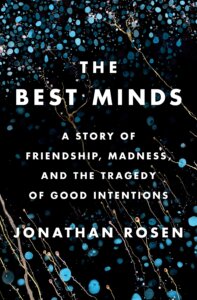This devastating memoir will break your heart
In ‘The Best Minds,’ Jonathan Rosen deconstructs a generation through the tragic story of his childhood friend Michael Laudor

Graphic by Angelie Zaslavsky
The Best Minds: A Story of Friendship, Madness, and the Tragedy of Good Intentions
By Jonathan Rosen
Penguin, 560 pages, $32
Jonathan Rosen refused to talk to the enterprising New York Times reporter who tried to interview him about his childhood friend. It was June 1998, and Michael Laudor had just brutally murdered his pregnant fiancée, stabbing her repeatedly and slitting her throat.
“I told myself that silence was a gift I could give Michael, who had suffered from too many words already, trapped in stories he could never live up to, let alone tell,” Rosen writes.
Twenty-five years later, Rosen — author of the novels Eve’s Apple and Joy Comes in the Morning and former culture editor of the Forward — is ready to confront those stories and his own kinship to a brilliant and endearing psychopath. In The Best Minds, Rosen breaks his silence, and the heart of any empathetic reader. It is a wrenching double memoir about converging and violently diverging lives.
“Michael and I grew up in a Norman Rockwell painting,” Rosen says of the leafy street in New Rochelle that the two boys’ families shared. It was a tranquil refuge from nearby New York City and the European bloodshed many of its Jews had fled. Both fathers were professors, and their sons communed over books. The friends were inseparable through high school but drew apart when Jonathan was chosen over Michael for editorship of the school newspaper. Both attended Yale, but Michael left Jonathan behind, graduating summa cum laude in only three years. While Jonathan became a husband, father and author, Michael’s life dissolved into a Lucian Freud painting.
Until his psychotic break, Michael was a wunderkind, a multi-talented dynamo whom everyone adored. While Michael put in a polished performance for his bar mitzvah, Jonathan, fleeing the bimah to throw up in the men’s room, never made it through his haftorah. He repeatedly compares the two of them to figures in an Aesop fable: “Michael had always been the hare to my tortoise,” he writes. With his new memoir, Rosen passes the finish line, while his old buddy languishes in the Mid-Hudson Forensic Psychiatric Center, a secure facility enclosed by a 15-foot-high fence topped with razor wire.

It might have been otherwise. While still confined involuntarily to Columbia Presbyterian Hospital for threatening his mother, Michael was accepted into Yale Law School. With the support and encouragement of faculty — especially Dean Guido Calabresi — and fellow students, he attended and excelled, openly acknowledging his schizophrenia and even counseling others in distress. Opposing the stigma attached to mental illness, he became an effective advocate for the disabled. “I can be a role model,” he declared.
When a feature article in The New York Times portrayed him as an inspiring example of how psychosis need not prevent sufferers from being functioning, constructive members of society, Michael was offered $600,000 to write a book to be called The Laws of Madness. He signed a contract for a $2.1 million movie deal, with Brad Pitt set to portray him. Everything unraveled when, convinced that she was a dangerous space alien, Michael Laudor murdered Carrie Costello.
Rosen borrows his title from the opening of Allen Ginsberg’s ‘Howl’”: “I saw the best minds of my generation destroyed by madness.” The line certainly applies to Michael, but, more than just a single case study in psychopathology, The Best Minds is cultural history and philosophical meditation.
Born in 1963, Rosen refers to Michael and himself as “cuspers,” arriving at the “tail end” of the Baby Boom generation. He frequently — and a bit glibly — refers to developments in generational terms, as if age determines attitude. Not everyone in “the generation formed in the crucible of World War II” shared the same values. But Rosen’s target is the zeitgeist, and he hits it, not least in his vivid evocation of what it was like for a middle-class Jewish kid to penetrate the Ivy League sanctum of Yale shortly after quotas were relaxed.
“Madness was in the air when Michael and I were growing up,” he contends, using One Flew Over the Cuckoo’s Nest, Rosemary’s Baby, and the Son of Sam as supporting evidence. Psychogenic drugs have been glorified and vilified throughout their lives. Derangement has been exalted as a higher form of perception, but mental illness has also been reviled as a menace to society. Rosen discusses the movement to remove all psychotics from the streets, but he also examines the countermovement to deinstitutionalize madness.
On the final page of The Best Minds, a Yale forensic psychologist exclaims: “We must learn from Michael Laudor!” The most devastating thing about this haunting, anguished book is that it remains unclear just what we can learn.





















